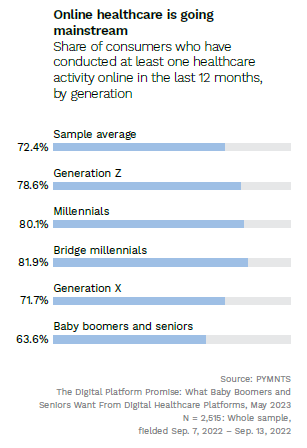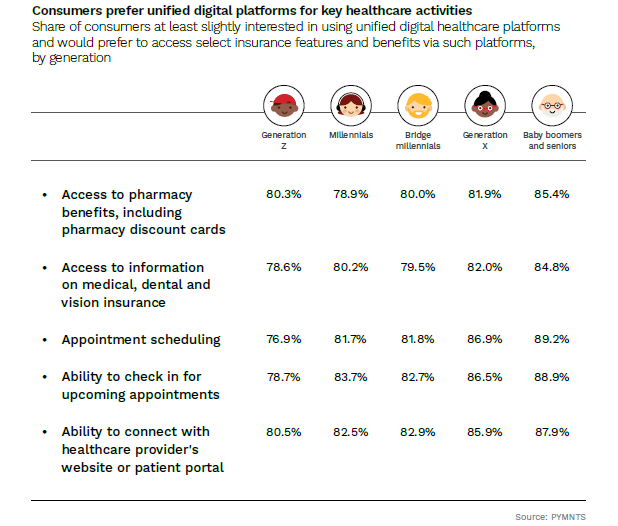Unified Digital Platforms Surge as Boomers Embrace Streamlined, Integrated Healthcare Solutions

The healthcare landscape is undergoing a digital transformation, witnessing a surge in consumer adoption of centralized online healthcare portals for managing a spectrum of medical services and benefits in one place.
These multifaceted platforms serve as centralized hubs, facilitating payment processing, overseeing prescriptions and pharmacy requirements, and providing access to comprehensive medical information, among other services. They prioritize patient convenience and personalized experiences, reflecting a shift toward patient-centric care.
Baby boomers and seniors, a cohort frequently typecast as being technology-averse, are embracing digital healthcare activities and show an affinity for these digital healthcare platforms.
As noted in the PYMNTS Intelligence study “What Baby Boomers and Seniors Want From Digital Healthcare Platforms,” approximately 65% of baby boomers — equivalent to around 55 million consumers — express interest in using these digital healthcare platforms. Moreover, 9 in 10 of them would prefer to conduct key healthcare activities through unified digital platforms.

The study also revealed that baby boomers and seniors are generally satisfied with their digital healthcare experiences, reporting higher satisfaction rates than the average consumer for activities such as scheduling appointments online. The ability to order and refill prescriptions and connect with healthcare providers through unified platforms is also highly appealing to this age group.
The trend toward consolidated digital healthcare platforms is underscored by the Thursday (Jan. 4) introduction of Eli Lilly’s LillyDirect platform, designed specifically for patients managing chronic conditions such as obesity, migraine and diabetes.
Patients can access independent healthcare providers and healthcare education information via the platform, as well as use a search tool to find nearby healthcare professionals for in-person care if preferred. The platform also includes LillyDirect Pharmacy Solutions, a digital pharmacy that ensures consistent access to prescribed medications delivered to patients’ homes.
The platform is designed to alleviate the burdens faced by patients living with chronic illnesses as they navigate the complex U.S. healthcare system, said Lilly Chair and CEO David A. Ricks in a Thursday press release.
“With LillyDirect, our goal is to relieve some of those burdens by simplifying the patient experience to help improve outcomes,” Ricks said in the release. “LillyDirect offers more choices in how and where people access healthcare, including a convenient home delivery option to fill Lilly medicines they have been prescribed.”

Frank Cunningham, group vice president, global value and access at Lilly, emphasized the growing reliance on digital solutions “to meet a variety of [consumers’] everyday needs — healthcare being one of them.” It’s the reason behind the LillyDirect launch, he noted, “with the hope that it will offer patients an innovative end-to-end experience to manage their health and access their medicines, so they can get back to living their lives.”
Looking ahead, the growing interest in consolidated online healthcare portals likely signifies a shift toward patient-centric healthcare experiences. These portals further represent a fundamental shift poised to reshape healthcare, creating a future where patients gain unrestricted access to innovative unified platforms that streamline processes, foster proactive healthcare management, and redefine the dynamics of the patient-provider relationship.
The evolution promises a more holistic and empowered approach to well-being, ensuring patients have greater control over their health journey.